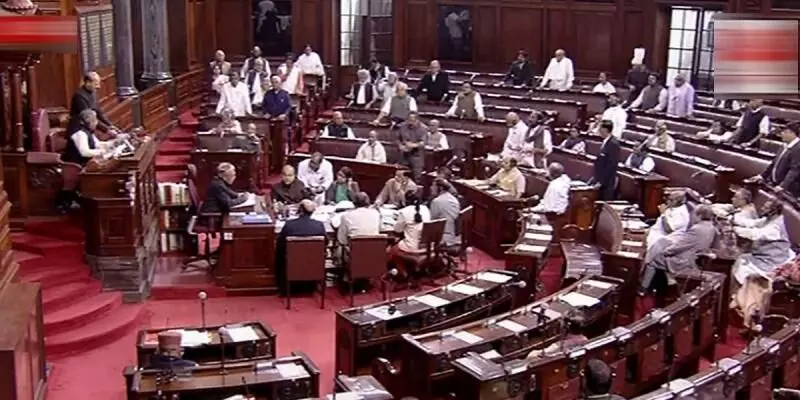While you were protesting
Important bills were passed in the Lok Sabha without the presence of the Opposition in direct contravention of the democratic essence of India

It’s a “watershed moment” indeed when key bills are passed in the Lok Sabha without the presence of the Opposition and with little to no real debate. Prudence would dictate that crucial legislature such as those that have a bearing on electioneering and criminal laws should be open to public debate. However, history was etched in the lower house of the Indian Parliament in this winter session when bills were tabled and passed with barely any participation from the Opposition.
The empty house was due to the suspension of a staggering 144 MPs who had protested the recent Parliament breach incident when two visitors set off a smoke canister and caused pandemonium in the new Parliament building. The punishment for the MPs who dared question the lax security at one of the most highly protected government buildings, resulted in them being shunted out of the house. Their ouster from the Lok Sabha paved a perfect path for important bills to be passed without opposition. Coincidence? Who can tell anymore but the timing was exquisite.
The bills that were passed were notable; among those were the Chief Election Commissioner (CEC) and other Election Commissioners (Appointment, Conditions of Service and Term of Office) Bill, 2023, three criminal bills (Bharatiya Nyaya Sanhita Bill replaced the Indian Penal Code, 1860; the Bharatiya Sakshya Adhiniyam Bill displaced the Indian Evidence Act, 1872; and the Bharatiya Nagarik Suraksha Sanhita Bill came in instead of the Criminal Procedure Code, 1973), and the contentious Telecommunications Bill, 2023. All these bills mandated argument, taking into consideration opposing views and perspectives. The CEC bill, for example, removes the earlier proposed statute of having the Chief Justice of India (CJI) as part of the selection committee, which could have ensured a transparent and unbiased process. The three criminal bills while shunting colonial nomenclature have also included controversial clauses that could witness the government (central, state, and local) using uncontrolled powers that could subvert a fair judicial system. The Telecommunications Bill, in turn, awards the government the right to take over telecom services in the “interest of national security”. Where are the checks and balances needed to restrain executive powers?
Such happenings create a terrible precedence for the democratic process in the country. Engaging the opposition parties and discussing their reservations is an unmissable aspect of any democracy. Erstwhile political stance (and albeit compulsion) had been to take the opposition along and reach a compromised position of consensus while dealing with path-breaking legislation. However, with absolute majority comes absolute power that can, if desired, push through laws without the participation of opposition parties. While outright political power is a reality today, the question we must ask is, should it be exercised? Passing bills without taking into consideration opposing points of view doesn't augur well for a democracy. Accommodating conflicting views and amending legislation in the egalitarian spirit would guarantee that no government or political party enjoys unbridled powers and citizens never face the prejudiced wrath of a police state. Staying true to the Constitution and vision of the forefathers of India, even when a party’s political powers are indomitable, will be the litmus test for India.
The writer is an author and media entrepreneur. Views expressed are personal




